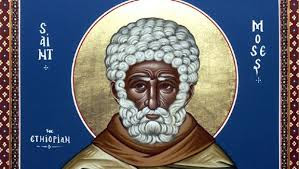1.2 – The Goal of the Ascetical
Life: Theosis
Opening Reflection
Imagine the Christian life not only as a journey of avoiding sin or
obeying commandments, but as a divine transformation into the likeness of God
Himself. This is the heart of Orthodox spirituality and asceticism: to
become by grace what God is by nature. This transformation is called Theosis.
1. What Is Theosis?
✨ Theosis (Greek: θέωσις) means
“deification” or “divinization.” It is the process by which a human person
becomes united with God, partaking in His divine nature (2 Peter 1:4)
without ceasing to be truly human.
📖 Biblical
Foundations
- 2 Peter 1:3–4:
“His divine power has granted to us all things that pertain to life and godliness… so that through them you may become partakers of the divine nature.” “የመለኮቱ ኃይል፥ በገዛ ክብሩና በበጎነቱ የጠራንን በማወቅ፥ ለሕይወትና እግዚአብሔርን ለመምሰል የሚሆነውን ነገር ሁሉ ስለ ሰጠን፥ በእግዚአብሔርና በጌታችን በኢየሱስ እውቀት ጸጋና ሰላም ይብዛላችሁ። ስለ ክፉ ምኞት በዓለም ካለው ጥፋት አምልጣችሁ ከመለኮት ባሕርይ ተካፋዮች በተስፋ ቃል እንድትሆኑ፥ በእነዚያ ክብርና በጎነት የተከበረና እጅግ ታላቅ የሆነ ተስፋን ሰጠን። - John 17:21–23:
Christ prays that His followers “may be one… as We are one” — an invitation into divine communion. “አንተ እንደ ላክኸኝ ዓለም ያምን ዘንድ፥ አንተ፥ አባት ሆይ፥ በእኔ እንዳለህ እኔም በአንተ፥ እነርሱ ደግሞ በእኛ አንድ ይሆኑ ዘንድ እለምናለሁ።”
❗ Not Pantheism or
Absorption (Heresies)
Theosis is not becoming God in essence (በባሕርይ). Rather, it is
participation in God’s uncreated energies (as taught by St. Gregory
Palamas) while remaining distinct from God's divine essence.
·
We never lose our personal identity or become God by nature.
·
Rather, through divine grace, we are united with Him and become like
Him—not in essence, but in energy.
·
This transformation, known as theosis, enables us to share in His divine
life by acquiring His attributes, such as love, humility, mercy, holiness,
peace, wisdom, patience, compassion, and righteousness.
·
In this way, we remain fully human while becoming, by grace, “partakers
of the divine nature” (2 Peter 1:4).
2. Theosis as the Goal of Asceticism
🛐 Through:
- Prayer
- Fasting
- Watchfulness (Nepsis) (ወደ ኃጢአት ከሚወስዱ
ሀሳቦች በንቃት ራስን መግራት)
- Obedience (መታዘዝ ለእግዚአብሔርና ለቤተ
ክርስቲያን)
- Repentance (በየቀኑ ወደ እግዚአብሔር
መመለስ / በንስሐ )
Through these spiritual
disciplines, the soul is purified and becomes a temple of the Holy Spirit.
🗣 St. Athanasius
the Great:
“God became man so that man might become god.”
This captures the heart of the Incarnation (ስጋዌ) and its link to
theosis—to become like God by grace.
3. How the Fathers Describe Theosis
🔹 St. Maximus the
Confessor:
“Theosis is the union of the human will with the divine will, accomplished by
grace, not by nature.”
🔹 St. Gregory
Palamas:
“Through the practice of virtues and asceticism, the soul becomes illumined by
God's uncreated energies.”
🔹 St. Athanasius:
“For He was made man that we might be made God.”
The Fathers emphasize synergy — cooperation between human effort
and divine grace.
4. The Role of Christ in Theosis
Jesus Christ is both God and man, the bridge between humanity and
divinity.
- Through His
incarnation, death, and resurrection (ትንሳኤ), Christ renews human nature and opens the way for union with God.
- Hebrews 2:14–18 states, Christ
partook of our nature so that we may partake of His.
- The ascetic
life imitates Christ’s humility and self-emptying, fitting the
believer to His image. “በክርስቶስ ኢየሱስ የነበረ ይህ አሳብ በእናንተ ዘንድ ደግሞ ይሁን። እርሱ በእግዚአብሔር መልክ ሲኖር ሳለ ከእግዚአብሔር ጋር መተካከልን መቀማት እንደሚገባ ነገር አልቈጠረውም፥ ነገር ግን የባሪያን መልክ ይዞ በሰውም ምሳሌ ሆኖ ራሱን ባዶ አደረገ፥ በምስሉም እንደ ሰው ተገኝቶ ራሱን አዋረደ፥ ለሞትም ይኸውም የመስቀል ሞት እንኳ የታዘዘ ሆነ።”(Philippians
2:5–8)
5. Theosis and the Sacramental Life
Theosis is not achieved in isolation, but within the Church, the
Body of Christ.
📿 Through the Holy
Mysteries:
- Baptism: Initiation
into divine life.
- Chrismation: Anointing
with the Spirit of divinity.
- Confession: Restoration
of the soul’s purity.
- Eucharist: Real
communion with Christ’s Body and Blood.
These sacraments are channels of uncreated grace, sustaining the
soul’s journey to theosis.
6. Practical Implications for
Ascetical Life
- Asceticism disciplines the
passions that darken the soul.
- Prayer and
watchfulness purify the heart for divine indwelling.
- Humility opens the soul
to divine illumination.
- Love becomes the
natural expression of a holy soul.
📌 As we struggle to
grow in holiness, our goal is not moral perfection, but communion with God—theosis.
7. Quotes from the Holy Fathers
🗣 St. Isaac the
Syrian:
“The heart that is enlightened by God shines forth in holiness, like the sun
illuminating all things around it.”
🗣 St. Symeon the
New Theologian:
“The goal of the Christian life is to become by grace what God is by nature.”
🗣 St. John
Climacus:
“The Ladder (መሰላል) to Heaven is climbed by those who seek to become godlike in purity and
love.”
8. Summary
- Theosis is the
ultimate aim of Orthodox asceticism: union with God, transformation
of the soul, and shining holiness.
- It is
accomplished through grace, ascetical struggle, and life
within the Church.
- The Orthodox
Fathers teach that asceticism is the path that clears the soul to receive
God’s presence, not merely for moral improvement but for divine
participation.
9. Scripture for Meditation
📖 2 Peter 1:3–4
📖 John 17:21–23
📖 Hebrews 2:14–18
📖 Philippians
2:5–8




No comments:
Post a Comment